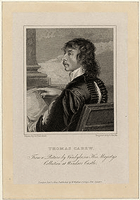Thomas Carew
Thomas Carew Poems
Ask me no more where Jove bestows,
When June is past, the fading rose;
For in your beauty's orient deep
These flowers, as in their causes, sleep.
...
He that loves a rosy cheek,
Or a coral lip admires,
Or from star-like eyes doth seek
Fuel to maintain his fires:
...
IN Celia's face a question did arise,
Which were more beautiful, her lips or eyes ?
“ We,” said the eyes, “send forth those pointed darts
...
HE that loves a rosy cheek,
Or a coral lip admires,
Or from star-like eyes doth seek
Fuel to maintain his fires:
...
I do not love thee for that fair
Rich fan of thy most curious hair;
Though the wires thereof be drawn
Finer than threads of lawn,
...
Give me more love or more disdain;
The torrid, or the frozen zone,
Bring equal ease unto my pain;
The temperate affords me none;
...
Know Celia, since thou art so proud,
'Twas I that gave thee thy renown;
Thou hadst, in the forgotten crowd
Of common beauties, liv'd unknown,
...
In Nature's pieces still I see
Some error that might mended be;
Something my wish could still remove,
Alter or add; but my fair love
...
Ask me no more where Jove bestows,
When June is past, the fading rose;
For in your beauty's orient deep
These flowers, as in their causes, sleep.
...
We read of kings and gods that kindly took
A pitcher fill'd with water from the brook ;
But I have daily tender'd without thanks
Rivers of tears that overflow their banks.
...
GAZE not on thy beauty's pride,
Tender maid, in the false tide
That from lovers' eyes doth slide.
Let thy faithful crystal show
...
IF the quick spirits in your eye
Now languish and anon must die;
If every sweet and every grace
Must fly from that forsaken face;
...
IF when the sun at noon displays
His brighter rays,
Thou but appear,
He then, all pale with shame and fear,
...
Ask me why I send you here
The firstling of the infant year;
Ask me why I send to you
This primrose all bepearled with dew:
...
SO grieves th' adventurous merchant, when he throws
All the long toil'd-for treasure his ship stows
Into the angry main, to save from wrack
Himself and men, as I grieve to give back
...
Now that the winter's gone, the earth hath lost
Her snow-white robes, and now no more the frost
Candies the grass, or casts an icy cream
Upon the silver lake or crystal stream;
...
THIS little vault, this narrow room,
Of Love and Beauty is the tomb;
The dawning beam, that 'gan to clear
Our clouded sky, lies darken'd here,
...
THE Lady Mary Villiers lies
Under this stone; with weeping eyes
The parents that first gave her birth,
And their sad friends, laid her in earth.
...
He that loves a rosy cheek,
Or a coral lip admires,
Or from starlike eyes doth seek
Fuel to maintain his fires;
...
Mark how the bashful morn in vain
Courts the amorous marigold,
With sighing blasts and weeping rain,
Yet she refuses to unfold.
...
Thomas Carew Biography
Thomas Carew was the son of a well-connected official and was educated at Merton College, Oxford and the Middle Temple in London. He worked as a diplomatic secretary in Italy, Holland and France, and soon gained a reputation as a poet. His talent secured him a place at court, and he was privileged to serve at Charles I's table. In 1634 his masque Coelum Britannicum was performed before the King. His poems, like those of other gentlemen of the era, were not published in his own lifetime but hand-written copies were circulated among his friends. These included Ben Jonson and John Donne, who both exercised a strong influence on Carew's poetry; in his Elegy Carew proclaims Donne 'the universal monarchy of wit'. Another poet he admired greatly was the Italian Giambattista Marino, whose wit and extravagant lifestyle resembled Carew's own. Though he never achieved the stature of Donne or Johnson, Carew was an elegant writer whose contribution to literature was typical of the stylish Cavalier school. A collected edition of his poems appeared shortly after his death.)
The Best Poem Of Thomas Carew
Ask Me No More
Ask me no more where Jove bestows,
When June is past, the fading rose;
For in your beauty's orient deep
These flowers, as in their causes, sleep.
Ask me no more whither do stray
The golden atoms of the day;
For in pure love heaven did prepare
Those powders to enrich your hair.
Ask me no more whither doth haste
The nightingale when May is past;
For in your sweet dividing throat
She winters and keeps warm her note.
Ask me no more where those stars 'light
That downwards fall in dead of night;
For in your eyes they sit, and there
Fixed become as in their sphere.
Ask me no more if east or west
The Phoenix builds her spicy nest;
For unto you at last she flies,
And in your fragrant bosom dies.

Great poet